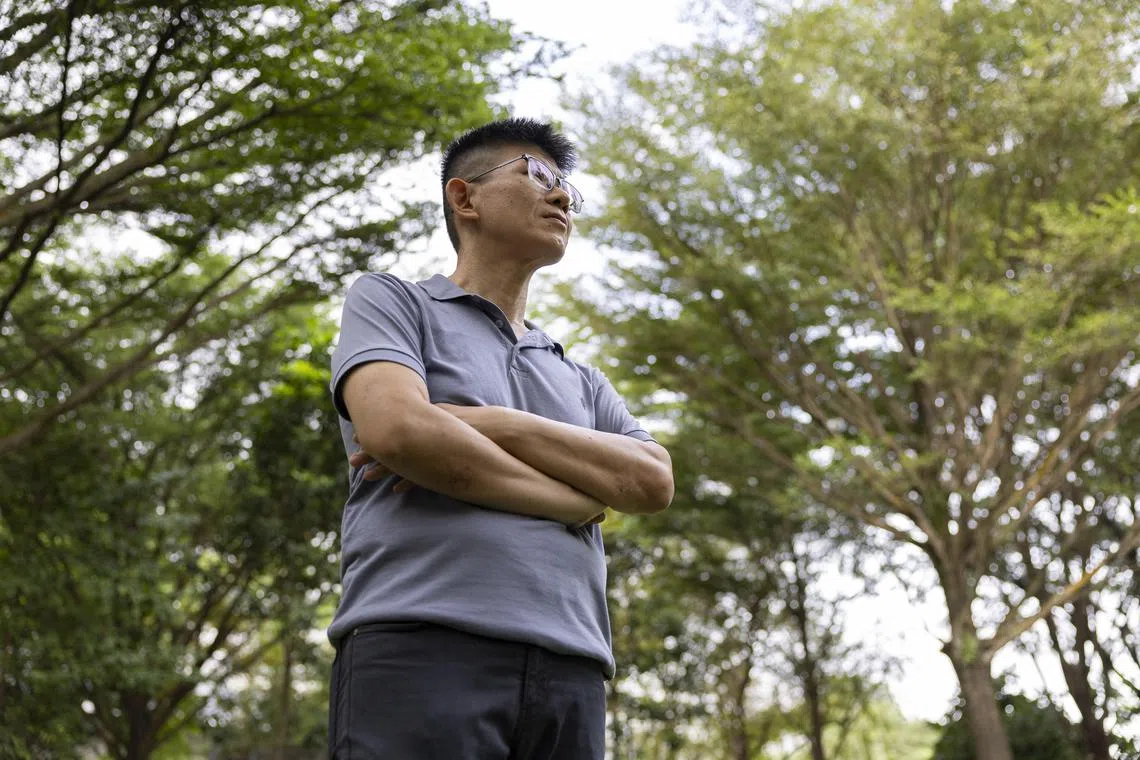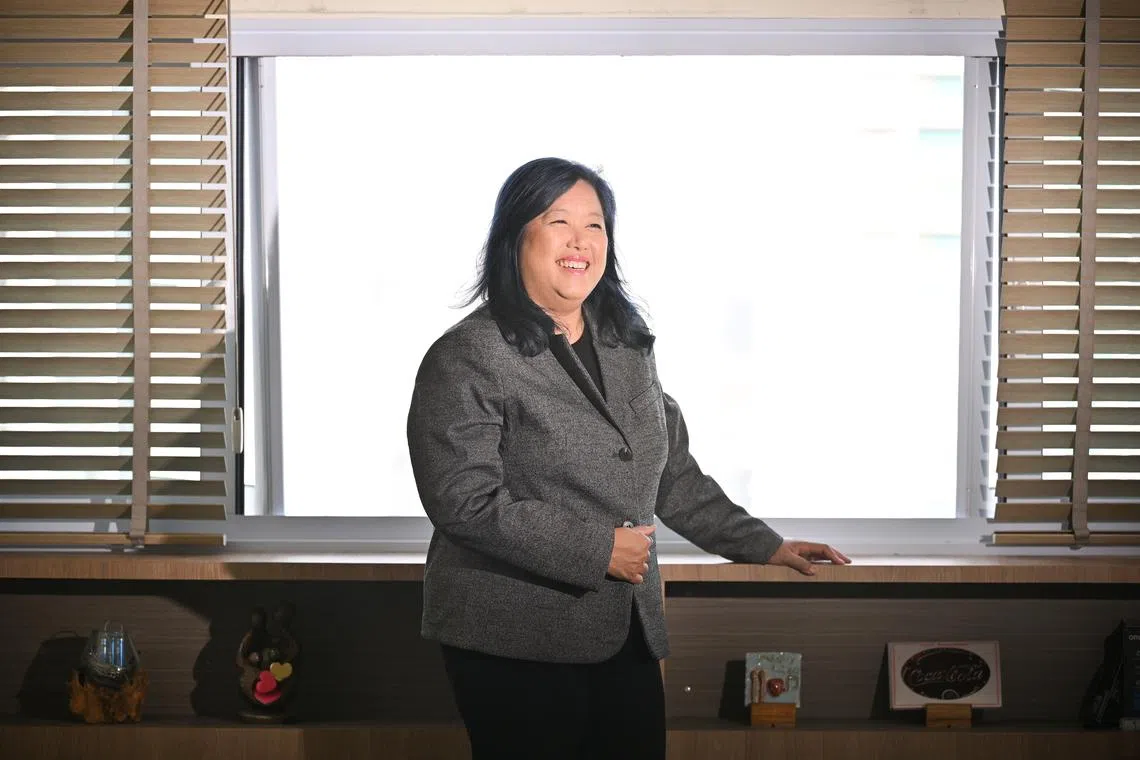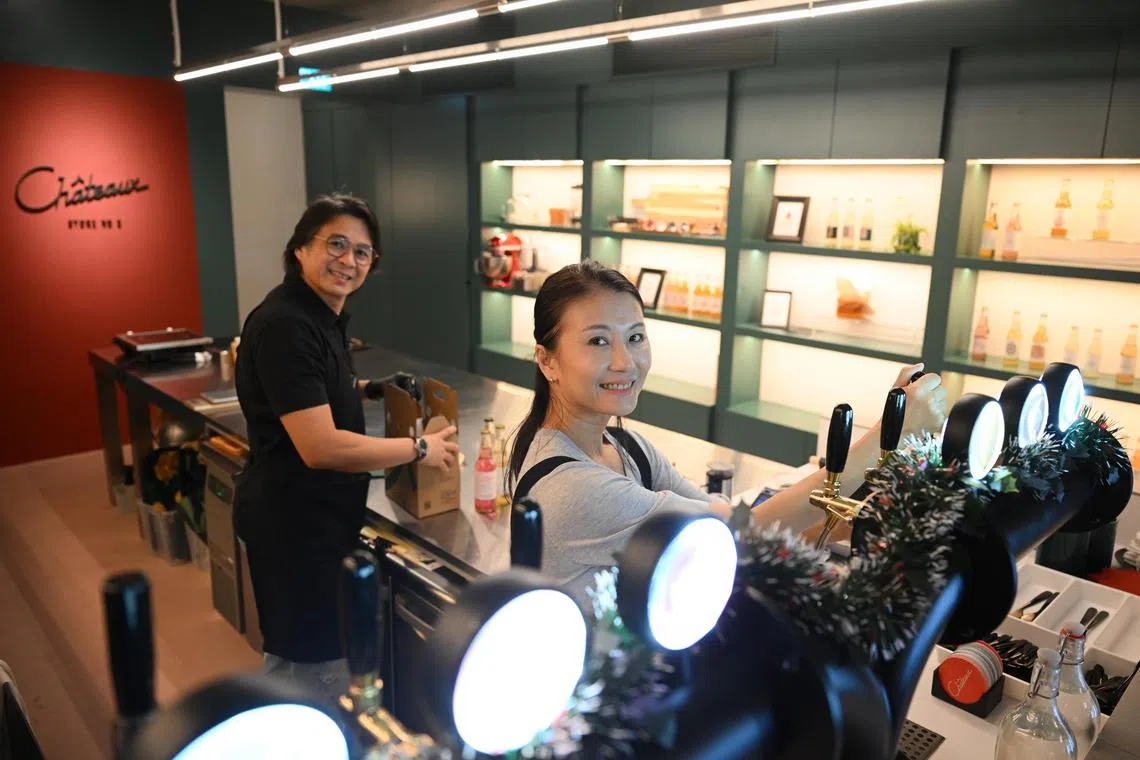Job jitters: Why do some worry about jobs when the S’pore labour market is strong?
Job security is a key concern some Singaporeans have and will be addressed at Budget 2025. The Straits Times unpacks why there are anxieties over jobs in this election year.
Sign up now: Get tips on how to grow your career and money

(From left) Mr Christopher Lim and Ms Lim Geok Keng started their own business Chateaux, and Ms Masni Goh found purpose as a transitions coach after they were retrenched.
ST PHOTOS: SHINTARO TAY, LIM YAOHUI
SINGAPORE - Human resources professional Ray Tan spent a year breaking retrenchment news to her colleagues during the Covid-19 pandemic.
As things looked increasingly dire, she was told that her role would not be impacted. But in December 2022, she was laid off with one month’s notice.
The 37-year-old, who declined to give her real name, went on to send out more than 300 resumes, but secured fewer than 30 job interviews. After a year-long job search, she found a new role in October 2024.
“There were times when it felt like there was no end in sight (to the search), and it really took a toll on my mental and emotional well-being,” she said.
Being in a firm where restructuring is taking place would obviously be distressing, but many Singaporeans are reporting anxieties even when the top-line numbers suggest their rice bowls are not under immediate threat.
The issue is pervasive enough that Prime Minister Lawrence Wong has said it will be a focus of the Budget statement
At a press conference in November 2024, he had noted that besides the cost of living, concerns about job security were often raised during his walkabouts.
“(It’s) not so much unemployment, because our unemployment rates are low, but concern about job security,” he said.
This reflects real concerns people have about disruptions caused by a more turbulent global environment and technological change, and worries about what their jobs will look like in the decades to come, said PM Wong.
With a general election that could be held by mid-year, these concerns are likely to weigh on voters’ minds.
That is likely why the Prime Minister has taken a personal interest in the matter, and intends to devote fiscal resources to tackling it, said Singapore Management University (SMU) law don Eugene Tan.
“Job insecurity can be the proverbial sword of Damocles that presents a clear and present danger to the ruling party,” he said.
A confluence of factors
At first glance, labour statistics do not bear out such insecurities, given that resident unemployment remained below 3 per cent in 2024, while long-term unemployment held steady at 0.8 per cent.
The incidence of discouraged workers – persons not counted in labour force numbers as they are not actively looking for work – is also at one of the lowest points on record, noted the Ministry of Manpower (MOM) in response to queries on the issue.
This shows that Singaporeans are resilient, with younger and mid-career workers actively engaged in career health initiatives, and embracing skills upgrading, and retraining, said MOM.
But economists pointed out that a number of rapid changes in the world of work meant there can concurrently be high employment and strong sentiments of job insecurity.
National University of Singapore economist Ong Ee Cheng noted that firms like Lazada and Shopee over-hired during the pandemic and have done multiple rounds of layoffs in recent years, while other multinationals like Dyson and Samsung announced retrenchments more recently.
High-profile layoffs in large technology companies could have created a sense of instability that permeated other sectors, and led workers to question the security of their own positions, said Singapore Management University assistant professor of organisational behaviour and human resources Nina Sirola.
Another trend is of contract work becoming more prevalent, as firms seeking to manage costs are more willing to offer such positions than permanent employment.
Associate Professor Walter Theseira from the Singapore University of Social Sciences said people would probably feel a high level of job insecurity if much of what is on offer is contract or gig work.
With workers likely to take on such roles if they see no alternative, “you can conceptually quite easily have both high job insecurity and low unemployment”, he said.
Recent surveys have attempted to look at the insecurity workers are feeling.
In a 2023 report on the future of work
Among respondents in sectors such as production and transport operations, almost half said they were concerned.
A 2025 survey on economic sentiments by the National Trades Union Congress (NTUC) found that 34 per cent of respondents expressed concern about losing their jobs in the next three months.
The figure was almost 40 per cent in 2024 and 25 per cent in 2023, the annual survey of 2,000 respondents showed.
The speed of technology change, as seen in the rise of generative artificial intelligence (AI), has also thrown out the window the sense of linear progression that workers used to have about climbing the corporate ladder, said IPS senior research fellow Laurel Teo.
“You might have to hit the pause button and take some months or years out to rethink your career, retrain and find your way in a new industry. There will be significant disruptions, there will be starts and stops,” she said. “It’s not merely job insecurity that worries people. It’s career insecurity.”
This was the case for copywriter Tien Wei Xuan. On seeing what AI tools like ChatGPT could do, a fear of irrelevance prompted the 31-year-old to seek advice on a career change.
Others like IT professional Subuwanto Widjaja, who was retrenched in July 2024, decided to pivot. He tried to switch to the growing field of cyber security.

IT professional Subuwanto Widjaja worries about he can successfully switch to a more secure career.
ST PHOTO: BRIAN TEO
The 50-year-old Singaporean applied to a training career conversion programme to become a cyber-security specialist and attended a walk-in interview.
“I waited for four hours, and was promised that I would be sent a link for an online assessment as the next step,” said Mr Widjaja. But he did not hear back.
While he eventually found a job back in IT, he still worries about how he can successfully switch to a more secure career.
Mid-career workers facing more job insecurity
NTUC, which has been tracking worker sentiment about job insecurity in recent years, said mid-career workers generally feel it more acutely.
In a 2022 survey of 1,000 workers, those between 35 and 54 years old were most concerned about losing their jobs, with eight in 10 saying they worried about this sometimes or often, noted NTUC deputy secretary-general Desmond Tan.
Besides finding difficulties keeping their skills up to date while juggling family responsibilities, mid-career workers may experience heightened job insecurity due to concerns about employability, age discrimination in the workplace, and bosses’ perception that older workers are less adaptable to new technologies and changes, he said.
Government data suggests that this group may be struggling more than others – experiencing longer stints out of work, and being unemployed in larger numbers, despite low unemployment figures overall.
MOM figures released on Jan 27 showed that those aged 40 and above stay unemployed for longer than younger ones.
In 2024, around 5,000 workers aged 50 and over were unemployed for more than a year, compared with 1,600 aged between 40 and 49, and around 1,700 aged between 30 and 39.
Additionally, older workers with higher qualifications are experiencing longer periods of unemployment.
Workers with degrees aged 50 and over stayed unemployed for a median of 18 weeks, compared with 15 weeks for the same group with diplomas or professional qualifications, and eight weeks for those with secondary education.
Those in this age group may feel the insecurity more keenly as well, given the contrast with the experiences of their parents.
Getting a degree and a good job, then remaining loyal to one employer for decades was then an assured path to financial stability and job security, said workers.
Ms Andrea Tan, 44, who has jumped from banking to consulting and then to fintech, said: “The business cycle is shortening and you are likely to have more than one job in your career journey. That is something that was very hard for my parents to understand.”
Two workers who felt the job market shift under their feet were Mr Christopher Lim and his wife, Ms Lim Geok Keng, both 50.
Despite profitability growing significantly under his watch, Mr Lim was unexpectedly let go as managing director and general manager of a multinational food technology company in 2020.
Three years earlier, his wife was retrenched from her role as country director and chief executive after 18 years at a financial services firm.
Doing well at school and showing loyalty in the office – values Ms Lim was told as a child would lead to long-term stability – did not pan out as she expected.
Another worker in her 50s, Ms S.Y. Chew, said that despite completing an upskilling course to be an adult education trainer, she was rejected from over 100 jobs in a two-year period. She eventually found work through past professional connections.
Major moves made so far
While Singaporeans await job-related support measures in Budget 2025, some major moves have already been made, said Associate Professor Tan of SMU. He noted that the issue is as much tied to immigration and foreign labour policy – a perennial political sticking point – as it is to technological upheaval.
Political observer Zulkifli Baharudin said ensuring Singaporeans have good jobs and a secure future has historically been part of the People’s Action Party (PAP) Government’s social compact with the people, and there is every indication this will remain central under PM Wong’s watch.
Various policies in recent years have sought to address workers’ concerns over foreign labour, including stronger penalties against discriminatory hiring under an enhanced Fair Consideration Framework in 2020.
At Budget 2022, the Government announced that minimum qualifying salaries for new Employment Pass (EP) and S Pass holders would be raised, while the number of work permit holders in the construction and process sectors would be reduced.
PM Wong also announced then that Singapore would refine how it assesses EP applications, creating the Complementarity Assessment Framework (Compass) requirement mandating that firms meet a set of criteria besides qualifying salary.
Prof Tan said the landmark Workplace Fairness Bill passed in January should also be seen as part of the overall endeavour to deal with job insecurity. The new law expressly prohibits workplace discrimination in the categories of age, disabilities, nationality, race and sex.
Prof Theseira added that for older professionals, managers, executives and technicians (PMETs), “actually all the policy levers have been pulled”.
These include government incentives to support the employment of older workers and the raising of the retirement and re-employment ages. Such workers can also tap retraining and career placement support through agencies such as Workforce Singapore, SkillsFuture Singapore, NTUC’s e2i (Employment and Employability Institute), he added.
At National Day Rally 2024, PM Wong also announced the SkillsFuture Jobseeker Support Scheme
From April 2025, it will provide up to $6,000 for eligible workers to undergo training and career coaching to find their next job.
The “live” question remains how to have high-skilled foreign employment while also prioritising the interests of local high-skilled workers, which is a difficult balance, said Prof Theseira.
“There is demand for skills that is hard to meet in the local workforce, and you want to expand economic opportunities in Singapore, but it’s hard to avoid the feeling that some of it is in competition,” he added.
Both these issues – the role of foreign workers here, and securing Singaporeans’ jobs and livelihoods – saw extensive debate in Parliament in 2021, with the issues aired fully.
In a 10-hour debate that ended past midnight, the Government said Singapore’s answer to foreign competition in its job market cannot be to shut its doors, but to deepen investments in its people and mitigate the downsides of an open economy and strive for growth that benefits all.
SkillsFuture, introduced a decade ago, has been one of the Government’s key investments in helping Singaporeans deal with the changing nature of work.
Amid the consistent messaging on how Singaporeans can take action themselves to reskill or upskill, the national movement’s growing take-up rate meant that it met its target of 500,000 people attending its courses every year.
The next phase of the programme is not about numbers, but about the quality of the programmes, Education Minister Chan Chun Sing said in December.
Dr Teo of IPS pointed out SkillFuture’s success in helping Singapore workers become aware of impending job changes and the need to reskill, but suggested that different approaches need to be taken for different groups.
Low-wage earners and higher-wage earners, for example, need different kinds of help, not just in terms of the level of support or subsidy, but also how the programmes are designed and delivered, she said.
Transitions coach Masni Goh, 54, said she felt confusion and insecurity around reskilling as she still wanted to work after being retrenched, and was not prepared to be unemployed, but did not know what industry or field she could find work in.

Ms Masni Goh found purpose as a transitions coach after she was retrenched.
ST PHOTO: LIM YAOHUI
Being let go left her with feelings of inadequacy and insecurity after a career heading departments in large organisations, and a sense that she would not be employable because she was older, she said.
Ms Goh, who now helps others through similar transitions and has founded coaching practice Mindcoach.sg, said: “The question many have is, if I am supposed to upgrade, what is it I’m supposed to be upgrading to do?”
SMU’s Dr Sirola noted that while Singapore’s strong emphasis on meritocracy and competitiveness instils a drive for continuous achievement, it can also lead to anxiety about job stability.
“The cultural expectation of lifelong learning and upskilling, while beneficial, can create pressure to constantly adapt, contributing to feelings of insecurity,” she added.
Election issue?
Long-running success by the PAP in fulfilling the promise of good jobs means many Singaporeans have come to assume that they will always be employed, said Mr Zulkifli, a former Nominated MP.
They might make life decisions based on this assumption, including taking long loans for their homes and cars, he added.
“But disruption to jobs will now be a permanent feature of life, and the Government will have to prepare the people for that reality as well as provide help and support,” he said.
SMU’s Prof Tan said it is unreasonable to think the Government can guarantee an iron rice bowl, but the PAP will have to persuade Singaporeans that measures it has put in place will work well and reduce anxieties.
This will be no easy feat, as such sentiments are pervasive around the world, but there are crucial reasons why PM Wong and the PAP will want to ensure that job insecurity is well assuaged, he added.
At its heart, this is a bread-and-butter issue, and if people feel deeply that not enough is being done and a bleak future awaits them, then they are not going to support the incumbent government, said Prof Tan.
“It could unleash a torrent of negative perceptions of and opposition to other important policies, such as Smart Nation 2.0 and immigration,” he added.
When the general election comes around, Singaporeans can expect the PAP and opposition parties to lock horns on this issue, said Prof Tan.
The difference will be in how each party will propose to deal with it, and how to fund measures to reduce job insecurity will be hotly contested, he added.
Some such as Mr Lim and Ms Lim said they do not necessarily see it as the Government’s job to solve employment issues.
Three years after her retrenchment, Ms Lim started a home-based business brewing and delivering kombucha, a fermented drink.
Her brand, known as Chateaux, has since expanded to two physical locations, with Mr Lim working as its chief strategy officer since his own retrenchment.

Mr Christopher Lim and Ms Lim Geok Keng were retrenched after high-flying corporate careers. The couple have started their own business - Chateaux, a kombucha store.
ST PHOTO: SHINTARO TAY
Whatever the sentiments, the new nature of work is a chance for PM Wong to redefine and carve out a new narrative around industrial relations, said Mr Zulkifli.
He said: “Budget 2025 will be a crucial opportunity for him to find a way to engage workers, and show that providing relief is a priority.
“If it is not handled well, people may become indifferent to the Government and sceptical of its ability to help them in these terms.”


